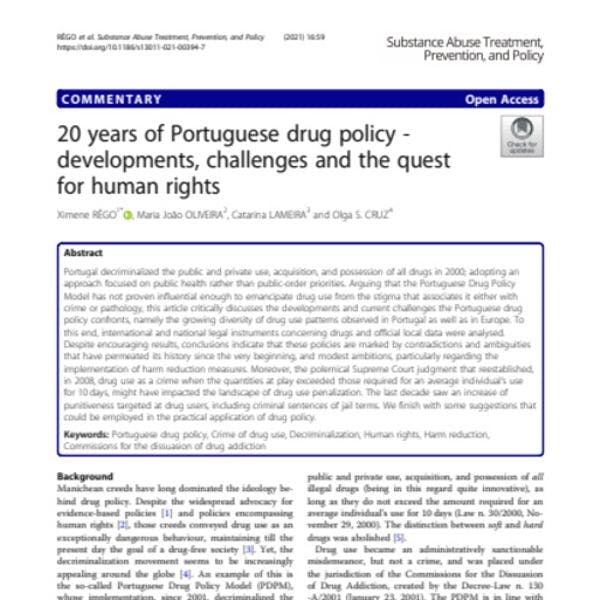20 años de políticas sobre drogas en Portugal - Desarrollos, retos y la lucha por los derechos humanos
Rêgo et al. sostienen que, pese a avances positivos posibilitados por el modelo de Portugal, sus limitadas ambiciones, la falta de actualización, y los retrocesos hacia respuestas punitivas han socavado severamente su potencial. Más información, en inglés, está disponible abajo.
By Ximene RÊGO, Maria João OLIVEIRA, Catarina LAMEIRA and Olga S. CRUZ
Portugal decriminalized the public and private use, acquisition, and possession of all drugs in 2000; adopting an approach focused on public health rather than public-order priorities. Arguing that the Portuguese Drug Policy Model has not proven influential enough to emancipate drug use from the stigma that associates it either with crime or pathology, this article critically discusses the developments and current challenges the Portuguese drug policy confronts, namely the growing diversity of drug use patterns observed in Portugal as well as in Europe. To this end, international and national legal instruments concerning drugs and official local data were analysed. Despite encouraging results, conclusions indicate that these policies are marked by contradictions and ambiguities that have permeated its history since the very beginning, and modest ambitions, particularly regarding the implementation of harm reduction measures. Moreover, the polemical Supreme Court judgment that reestablished, in 2008, drug use as a crime when the quantities at play exceeded those required for an average individual’s use for 10 days, might have impacted the landscape of drug use penalization. The last decade saw an increase of punitiveness targeted at drug users, including criminal sentences of jail terms. We finish with some suggestions that could be employed in the practical application of drug policy.
